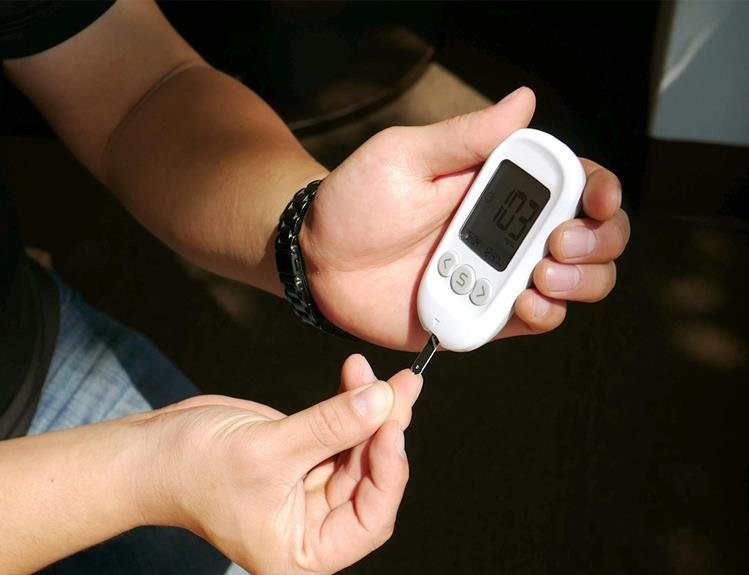Exploring Natural Remedies for Diabetes Neuropathy
Have you ever considered exploring natural remedies to address the symptoms of diabetes neuropathy?
From herbal supplements to lifestyle changes, there is a wide range of options that may offer relief and improve your quality of life.
Herbal supplements such as alpha-lipoic acid and evening primrose oil have shown promising results in managing neuropathic pain. Acupuncture therapy, when combined with conventional treatments, has also demonstrated effectiveness.
Essential oils like lavender and peppermint could provide soothing benefits.
Stay tuned to discover more about these natural alternatives and their potential benefits for managing diabetes neuropathy.
Herbal Supplements
When managing diabetes neuropathy, consider incorporating herbal supplements to help alleviate symptoms. Herbal supplements like alpha-lipoic acid, evening primrose oil, and capsaicin have shown promise in reducing pain and improving nerve function.
Alpha-lipoic acid, a powerful antioxidant, can help reduce inflammation and nerve damage. Evening primrose oil, rich in gamma-linolenic acid, may assist in reducing neuropathic pain. Capsaicin, derived from chili peppers, has been found to relieve pain by decreasing the levels of substance P, a chemical that transmits pain signals.
These herbal supplements can complement traditional treatments and provide relief from the discomfort associated with diabetes neuropathy. However, it's essential to consult with your healthcare provider before adding any herbal supplements to your regimen, as they may interact with medications or have side effects.
Acupuncture Therapy
Consider exploring acupuncture therapy as another alternative approach to managing diabetes neuropathy symptoms, offering potential relief and improved nerve function. Acupuncture, a traditional Chinese medicine practice, involves inserting thin needles into specific points on the body to stimulate energy flow and promote healing. This therapy is believed to help regulate the nervous system, reduce inflammation, and enhance blood circulation, which can be beneficial for individuals with diabetes neuropathy.
Research suggests that acupuncture may help alleviate neuropathic pain, tingling, and numbness commonly associated with diabetic neuropathy. By targeting key acupuncture points, this treatment may help improve nerve conduction and function, leading to reduced symptoms over time. Many individuals find acupuncture sessions to be relaxing and soothing, providing not only physical but also mental relief from the challenges of neuropathy.
If you're considering acupuncture therapy for diabetes neuropathy, it's essential to consult with a licensed acupuncturist experienced in treating neuropathic conditions. They can tailor a treatment plan to address your specific symptoms and help you on your journey to managing diabetes neuropathy naturally.
Essential Oils
Exploring the benefits of essential oils can provide you with another natural approach to alleviate symptoms of diabetes neuropathy. Essential oils like lavender, peppermint, and rosemary have been studied for their potential to help manage neuropathic pain and discomfort. These oils can be applied topically after dilution with a carrier oil, such as coconut or almond oil, to help reduce inflammation and improve circulation in the affected areas.
Lavender oil, known for its calming properties, may help reduce stress and anxiety often associated with diabetes neuropathy. Peppermint oil has a cooling effect that can provide relief from tingling sensations and numbness. Rosemary oil, with its anti-inflammatory properties, may help alleviate pain and improve nerve function over time.
When using essential oils, it's essential to perform a patch test to check for any allergic reactions and always dilute them before applying to the skin. Incorporating these oils into your daily self-care routine may offer you a natural way to manage the symptoms of diabetes neuropathy.
Yoga and Meditation
When dealing with diabetes neuropathy, consider integrating yoga and meditation into your routine. These practices can enhance the mind-body connection, offer stress-reducing techniques, and contribute to improved nerve function.
Mind-Body Connection Benefits
Embracing yoga and meditation can significantly enhance the mind-body connection, offering potential benefits for managing diabetes neuropathy symptoms. These practices can help reduce stress levels, improve blood circulation, and promote relaxation, which are all crucial for individuals dealing with neuropathy.
Yoga, with its gentle stretches and poses, can increase flexibility and reduce muscle tension, potentially alleviating neuropathic pain. Additionally, meditation focuses on mindfulness and deep breathing, which can help calm the nervous system and enhance overall well-being.
Stress Reduction Techniques
Incorporate stress reduction techniques like yoga and meditation into your daily routine to alleviate symptoms of diabetes neuropathy. These practices can help lower stress levels, which in turn may reduce nerve pain and improve overall well-being.
Yoga combines physical postures, breathing exercises, and meditation to promote relaxation and relieve tension in the body. Regular practice of yoga has been shown to decrease inflammation and enhance circulation, potentially benefiting individuals with diabetes neuropathy.
Similarly, meditation focuses on calming the mind and fostering mindfulness, which can aid in managing the discomfort associated with neuropathic symptoms. By incorporating these stress-reducing techniques into your daily regimen, you may experience relief from the effects of diabetes neuropathy and improve your quality of life.
Improved Nerve Function
To enhance nerve function and alleviate symptoms of diabetes neuropathy, consider integrating yoga and meditation practices into your daily routine.
Yoga involves gentle stretching and poses that can improve circulation and reduce nerve pain. Regular practice of yoga can also help lower stress levels, which is beneficial for managing neuropathy symptoms.
Meditation, on the other hand, promotes relaxation and can reduce the perception of pain associated with diabetic neuropathy. By incorporating these practices into your daily life, you may experience improved nerve function, reduced discomfort, and a better quality of life.
Remember to consult with your healthcare provider before starting any new exercise or relaxation regimen to ensure it aligns with your overall diabetes management plan.
Dietary Modifications
Focus on incorporating more nutrient-rich foods into your diet to support your overall health and manage diabetes neuropathy symptoms effectively.
Be mindful of controlling your sugar intake, as high blood sugar levels can worsen neuropathy.
Making these dietary modifications can play a significant role in improving your condition and enhancing your quality of life.
Nutrient-Rich Foods
Boost your diet with nutrient-rich foods to help manage diabetes neuropathy symptoms effectively. Incorporating foods high in vitamins, minerals, and antioxidants can support nerve health and reduce inflammation.
Focus on consuming plenty of leafy greens like spinach and kale, which are rich in vitamin K and antioxidants. Additionally, include fatty fish such as salmon and mackerel in your meals for omega-3 fatty acids that help combat inflammation.
Nuts and seeds like almonds, walnuts, and flaxseeds are great sources of vitamin E and healthy fats, which can benefit nerve function. Opt for fiber-rich foods like beans, lentils, and whole grains to help regulate blood sugar levels and support overall nerve health.
Sugar Intake Control
Reduce your sugar intake through dietary modifications to effectively manage diabetes neuropathy symptoms and support overall nerve health.
Excessive sugar consumption can worsen nerve damage by causing inflammation and impairing blood sugar control. Opt for natural sweeteners like stevia or monk fruit, and limit your intake of sugary treats, sodas, and processed foods.
Instead, focus on whole foods like fruits in moderation, high-fiber grains, and vegetables to help stabilize blood sugar levels. Reading labels can help you identify hidden sugars in packaged products.
Physical Therapy
Physical therapy can play a significant role in managing diabetes neuropathy by improving flexibility and strength in affected areas. Regular physical therapy sessions can help alleviate pain, increase circulation, and enhance overall quality of life for individuals with diabetes neuropathy. Through targeted exercises and stretches, physical therapists can specifically address the affected nerves and muscles, promoting better mobility and function.
During physical therapy sessions, you may engage in various activities such as gentle stretching exercises, low-impact aerobic workouts, and balance training. These exercises aim to reduce nerve pain, improve muscle strength, and enhance coordination. Additionally, physical therapists can provide guidance on proper posture and body mechanics to prevent further nerve damage and discomfort.
Consistency is key when it comes to physical therapy for diabetes neuropathy. By adhering to a structured exercise program tailored to your needs, you can experience long-term benefits such as reduced pain, improved range of motion, and enhanced overall well-being. Remember to communicate openly with your physical therapist about any concerns or progress you may experience during your sessions.
Lifestyle Changes
Making adjustments to your daily habits and routines can have a significant impact on managing diabetes neuropathy. Incorporating regular physical activity into your routine, such as walking or swimming, can help improve blood flow to your extremities and reduce neuropathic pain. Aim for at least 30 minutes of moderate exercise most days of the week.
Maintaining a healthy diet is crucial in managing diabetes neuropathy. Focus on consuming a variety of nutrient-dense foods such as fruits, vegetables, whole grains, and lean proteins. Limiting your intake of processed foods, sugary drinks, and high-fat meals can help stabilize blood sugar levels and prevent further nerve damage.
Managing stress through relaxation techniques like deep breathing, meditation, or yoga can also benefit individuals with diabetes neuropathy. High stress levels can exacerbate symptoms, so finding ways to unwind and decompress is essential.
Additionally, ensuring you get an adequate amount of quality sleep each night can support overall nerve health and improve your body's ability to manage blood sugar levels. Prioritize a regular sleep schedule and create a relaxing bedtime routine to promote restful sleep.
Frequently Asked Questions
Can Diabetes Neuropathy Be Completely Cured With Natural Remedies?
You can manage diabetes neuropathy with natural remedies, but complete cure isn't guaranteed. Consistent care, lifestyle changes, and natural treatments like exercise, dietary adjustments, and herbs may help alleviate symptoms and improve overall well-being.
Are There Any Potential Risks or Side Effects Associated With Using Herbal Supplements for Diabetes Neuropathy?
When using herbal supplements for diabetes neuropathy, be cautious as potential risks and side effects can occur. Always consult with a healthcare provider prior to starting any new supplement regimen to ensure safety and effectiveness.
How Long Does It Typically Take to See Results From Acupuncture Therapy for Diabetes Neuropathy?
Like planting seeds and waiting for a garden to bloom, acupuncture's effects on diabetes neuropathy can vary. Some feel relief after a few sessions, while others may need more time for noticeable improvement.
Are There Specific Essential Oils That Are More Effective for Managing Diabetes Neuropathy Symptoms?
For managing diabetes neuropathy symptoms, some essential oils like lavender, peppermint, and chamomile may be more effective. Consult a healthcare provider before use, as individual responses vary. Incorporate these oils into your routine for potential relief.
Is There a Recommended Duration or Frequency for Practicing Yoga and Meditation to Help With Diabetes Neuropathy?
Like a gentle stream that soothes the weary traveler, practicing yoga and meditation daily can provide relief for diabetes neuropathy. Aim for at least 20 minutes each session, finding calm amidst the storm.
Conclusion
So, as you've seen, exploring natural remedies for diabetes neuropathy can offer relief and improve your quality of life.
Just like a tree growing roots to withstand a storm, incorporating herbal supplements, acupuncture therapy, essential oils, and other holistic approaches can help you weather the challenges of neuropathy.
By nurturing your body and mind with these natural remedies, you can strengthen your resilience and find peace amidst the storm of diabetes complications.






